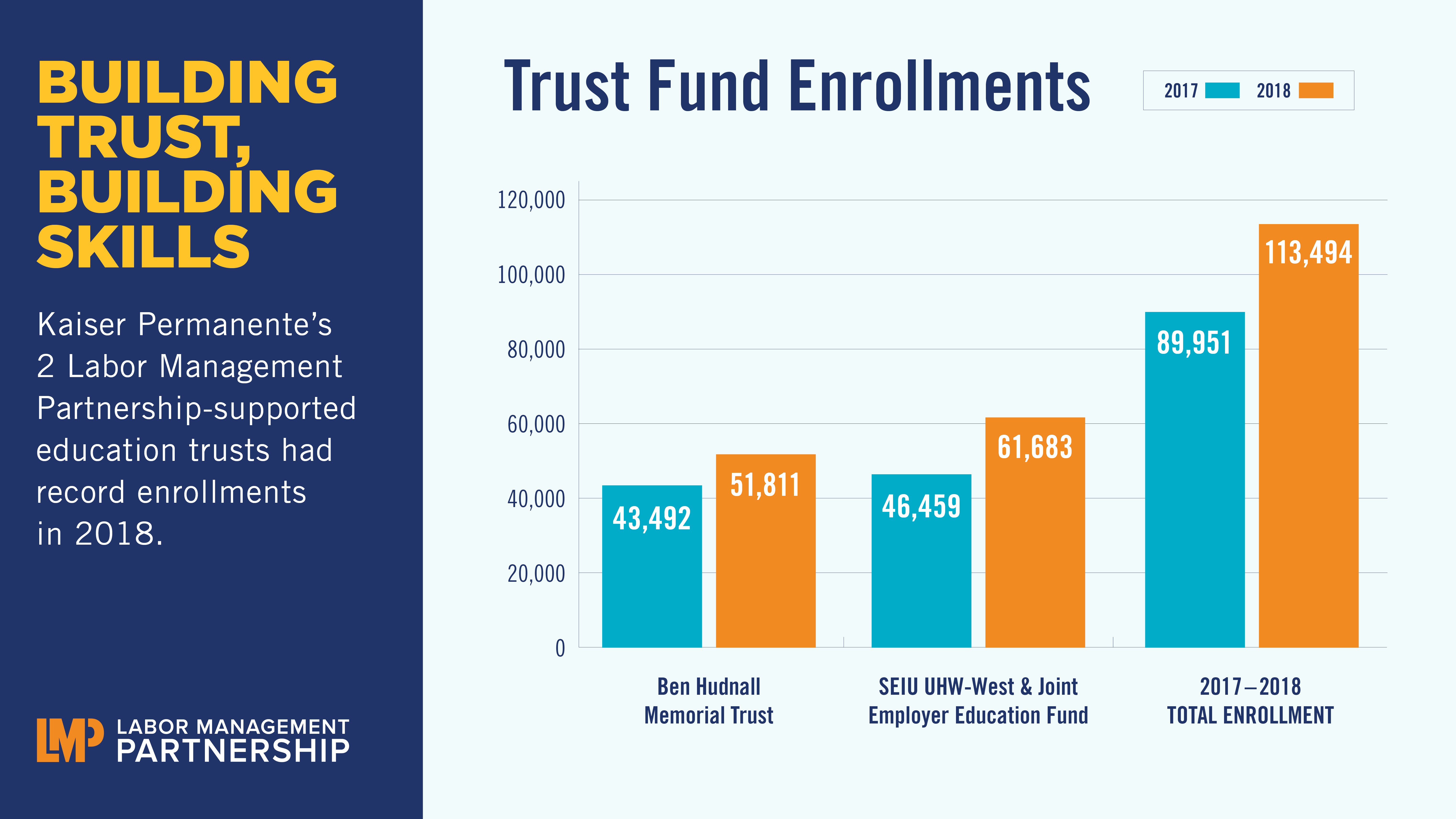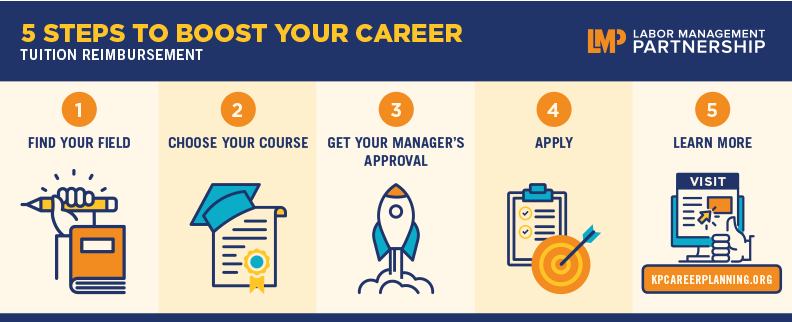Videos
()
An Oncology unit-based team comes up with a safety plan after a shooting victim unexpectedly showed up in their unit.
Produced by Tracy Silveria
Videography by Beverly White and Tracy Silveria
Deck
Kaiser Permanente employees use education trusts in record numbers
For Jennifer Cuevo, an urgent care nurse in Pasadena, the opportunity was too good to pass up: Earn a Bachelor of Science in Nursing without paying fees.
For Joel Boyd, manager of pulmonary clinical services in South Sacramento, teaming with a trust fund created an opportunity to teach nearly 500 respiratory therapists ways to improve care and lower costs.
From earning degrees to learning best practices, Kaiser Permanente employees are using the 2 Labor Management Partnership-supported education trusts (Ben Hudnall Memorial Trust and SEIU UHW-West & Joint Employer Education Fund) in record numbers. Program enrollments rose 26% in 2018 to 113,494; there were nearly 59,000 enrollments in the first half of 2019, on pace for another record year.
“We can address solutions,” says Rebecca Hanson, SEIU Education Fund executive director. “There’s overwhelming demand among the workforce for training opportunities aligned with patient care delivery needs.”
Through the trusts, employees can build skills, meet targeted needs in training programs, and work with career counselors to set career goals and create plans to achieve them.
“We’re preparing our workforce for the jobs of tomorrow,” says Jessica Butz, Ben Hudnall trust co-director.
Going for it
Cuevo, a 16-year Kaiser Permanente employee and UNAC/UHCP member, started as a licensed vocational nurse, then became a registered nurse. She always wanted a bachelor’s degree but put her dreams on hold while raising her children — until she talked with a Ben Hudnall career counselor and learned good news.
With a few additional courses, Cuevo could qualify for a bachelor’s program. The trust would pay the fees.
“I’m so thankful,” Cuevo says. “I wouldn’t have done this without the help of the trust and the partnership of Kaiser with the universities.”
Most classes were online, which Cuevo took at home. She did in-person requirements on days off — coordinating with her manager and family — completing her degree in 4 semesters. Her 17-year-old daughter is “really inspired,” Cuevo says. “She wants to go into research or be a doctor.”
Cuevo’s inspired, too. In November, she started a master’s program – paid again by Ben Hudnall. Cuevo, who wants to teach nurses, encourages colleagues to use trust services.
“Go for it,” she says. “It’s so worth it. Get your degree. Move up. You can do it. I did it. I love it.”
Benefits of partnership
When Boyd and pulmonary clinical services colleagues in Northern California reviewed their operations, they saw a need to standardize some patient care practices. Their goal: to decrease the length of stay for patients on mechanical ventilation to reduce the risk of such complications as pneumonia, improve care and lower costs.
They partnered with the SEIU Education Fund to organize 8 group trainings for respiratory therapists at Kaiser Permanente’s Garfield Innovation Center.
Working with the education fund was easy and helped get employee buy-in and participation, Boyd said. The trainings were so effective, more may be offered in Northern California and other regions.
“Nothing at this scale has ever been done for respiratory therapists,” Boyd says. “It was a true example of how we can get positive benefits from the Partnership.”
Deck
Tuition reimbursement opens doors for career advancement
Carol Fiskio takes pride in helping good employees move on.
As revenue cycle director for Kaiser Permanente’s Woodland Hills Medical Center, Fiskio has seen 3 of her department’s admitting clerks earn college degrees and advance to new positions.
Their formula: a desire to learn, flexible scheduling and a valuable employee benefit. Hers: supporting employees’ lifelong learning to make them, Kaiser Permanente and her department stronger players.
Kaiser Permanente encourages such learning, providing employees up to $3,000 each year for completing courses to continue their education, get a certificate or earn a degree. Tuition reimbursement course applications reached a record 73,224 in 2018, nearly doubling since 2015, when benefits increased for many employees after that year's Labor Management Partnership National Bargaining.
Psyched for psychology
When Olayinka Rahman started as an admitting clerk at Woodland Hills Medical Center in 2007, she had a vision: to become a psychologist. She balanced working and going to school, using tuition reimbursement to earn bachelor’s (California State University, Northridge), master’s (Pepperdine University) and doctoral (Azusa Pacific University) degrees in psychology.
“I don’t think there would be a better place (than Kaiser Permanente) for me to get my degree and continue to work,” Rahman says. “They’re so supportive. I hear about other organizations that aren’t as flexible and don’t have tuition reimbursement.”
After a yearlong internship in Michigan, Rahman returned to Kaiser Permanente. She completed a postdoctoral psychology residency in San Francisco and now works as a psychological assistant in Antioch. She’s preparing for the licensing exams to become a staff psychologist.
Rahman encourages others to continue their education.
“It was definitely challenging but well worth it,” Rahman says. “Talk with your manager, and say, ‘How can we make this work?’ Open communication with management is key.”
Strength in education
Fiskio, who used tuition reimbursement herself to earn an MBA, praised Rahman and her other former direct reports for advancing their careers through education.
“It’s not easy to go to work and to school,” Fiskio says. “That takes real dedication. It’s a benefit to the organization.”
Humans of Partnership:
Humans of Partnership:
Videos
()
A receptionist makes a mid-life career move, with the help of union educational benefits.
Find ways to grow your career at kpcareerplanning.org or the education trusts serving members of the Coalition of Kaiser Permanente Unions: SEIU UHW-West & Joint Employer Education Fund and Ben Hudnall Memorial Trust.
- Reviewing the Emergency Department’s patient intake procedure and documenting the number of forms used
- Brainstorming ways to reduce multiple forms and frequency of contact between clerks and patients
- Educating clerks and staff on the new technology, including the use of electronic signature pads
What can your team do to leverage technology to save money and improve the patient experience? What else could you do to help keep KP affordable for our member and patients?
Humans of Partnership:
Videos
()
This medical assistant used to fear computers. Now that she’s taken a digital fluency course, she is empowered to provide better care for her patients—and her family. Watch the video and then read more.


